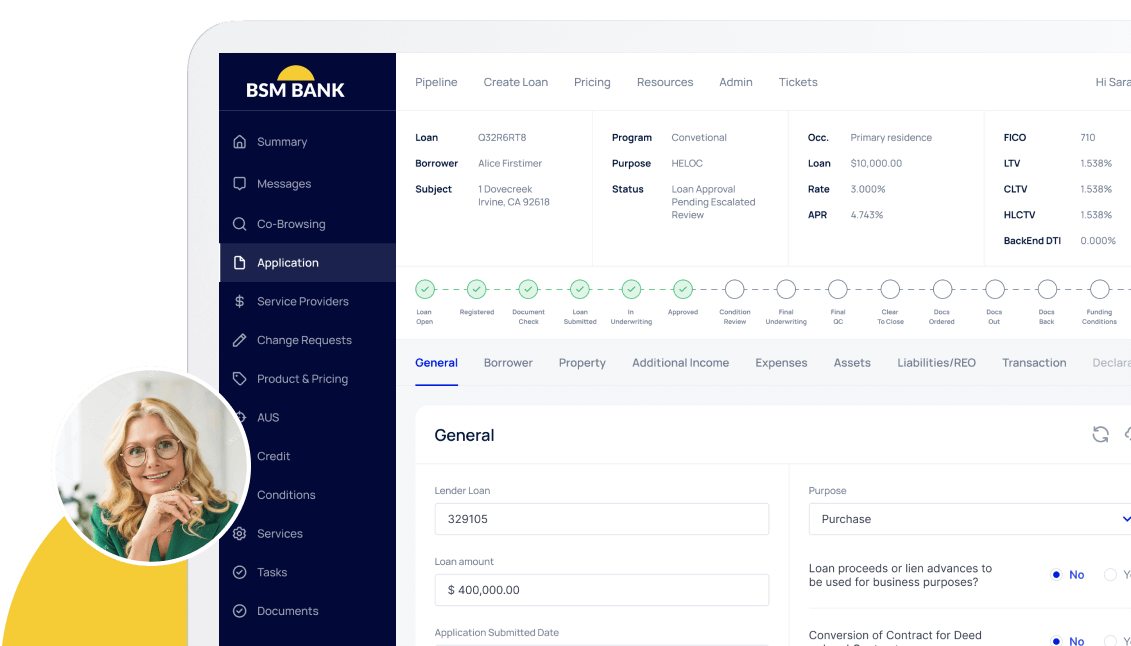Mortgage rates are a vital factor in the world of real estate and finance, significantly impacting homeowners, buyers and the broader economy. As we journey into 2024, the burning question is: What can we expect from mortgage rates in the coming year? To answer this question, we must consider a complex web of economic, geopolitical and financial factors that influence these rates.
In this blog post, we’ll delve into the crystal ball and explore the most prominent variables shaping mortgage rate predictions for 2024.
Table of Contents
The Current Mortgage Rate Landscape
According to the report from Yahoo, in late October, the average rate on the 30-year fixed-rate mortgage reached 7.79%, marking the highest level since November 2000. This substantial increase was driven by the Federal Reserve’s aggressive interest rate hikes to combat inflation. The elevated mortgage rates had a tangible impact on buyer behavior, contributing to a 5.6% decline in new home sales in October.
However, there is a silver lining: mortgage rates have recently retreated from their two-decade highs and now stand at levels last observed in late September. This rate shift could pave the way for a rebound in new home sales, providing relief to the housing market.
Economic Factors and Their Impact on Mortgage Rates
Economic indicators are some of the most significant determinants of mortgage rate trends. As we enter 2024, the following economic factors are expected to play a crucial role in shaping mortgage rates:
- Inflation: Inflation has been a hot topic in recent years. As the economy recovers from the pandemic, central banks have implemented various policies to control inflation. The Federal Reserve, in particular, may adjust its monetary policy, potentially impacting short-term interest rates. Changes in the federal funds rate can indirectly influence long-term mortgage rates.
- Job Market: A strong job market is traditionally associated with rising mortgage rates. However, the relationship between employment and mortgage rates can be more complex. A robust job market can also contribute to higher consumer spending and inflation, potentially pushing rates higher.
- GDP Growth: Economic growth can put upward pressure on rates. Strong GDP growth often leads to increased demand for borrowing, which, in turn, can drive rates higher. Conversely, a slowing economy might result in lower rates as central banks aim to stimulate economic activity.
- Global Events: Geopolitical events and global economic conditions can impact mortgage rates. Tensions in international relations, trade agreements and global economic trends can create uncertainty in financial markets, potentially leading to rate fluctuations.
- Housing Market Trends: The state of the housing market itself can influence mortgage rates. If the demand for homes remains high, rates may rise as lenders have less incentive to offer lower rates. Conversely, a cooling housing market could result in more competitive rate offerings to attract borrowers.

5. Housing Market Trends: The state of the housing market itself can influence mortgage rates. If the demand for homes remains high, rates may rise as lenders have less incentive to offer lower rates. Conversely, a cooling housing market could result in more competitive rate offerings to attract borrowers.
The Federal Reserve and Its Influence
The Federal Reserve plays a pivotal role in shaping mortgage rates. The central bank sets the federal funds rate, which directly impacts the short-term interest rates that influence variable-rate mortgages. Moreover, the Fed’s monetary policy decisions can indirectly affect long-term fixed-rate mortgages.
As of 2023, the Fed has been signaling its intention to gradually raise the federal funds rate to curb inflation and maintain economic stability. If these rate hikes continue into 2024, it could contribute to higher overall mortgage rates, making borrowing more expensive for homebuyers. However, the Fed’s decisions are data-driven and they take into account various economic indicators. Therefore, the pace and extent of rate hikes will depend on the economic landscape in 2024.
Subscribe to BeSmartee 's Digital Mortgage Blog to receive:
- Mortgage Industry Insights
- Security & Compliance Updates
- Q&A's Featuring Mortgage & Technology Experts
Housing Market Trends and Their Role
The state of the housing market itself has a significant impact on mortgage rates. Several factors can influence the housing market and, consequently, the rates offered to homebuyers. Here’s how housing market trends may play a role in 2024 mortgage rate predictions:
- Supply and Demand: The balance between housing supply and demand is a crucial factor. If housing inventory remains low while demand continues to rise, it can lead to higher home prices and, consequently, higher mortgage rates as lenders seek to capitalize on the strong market.
- New Construction: The rate of new home construction can affect the overall supply of homes. An increase in housing starts can help alleviate supply shortages and potentially moderate price increases.
- Affordability Concerns: As home prices rise, affordability becomes a concern for many potential buyers. High home prices may lead to decreased demand, which could put downward pressure on mortgage rates as lenders strive to attract borrowers.
- Regulatory Changes: Government regulations, tax policies and other legislative changes can also influence the housing market. For example, changes in tax incentives for homeownership or lending regulations can impact the cost and availability of mortgages.
The Global Economic Landscape
In an interconnected world, global economic conditions have a substantial impact on domestic mortgage rates. Here are some international factors to consider:
- Currency Exchange Rates: Currency exchange rates can influence foreign investment in the U.S. housing market. A strong U.S. dollar can attract foreign investors, potentially leading to increased demand for U.S. real estate and affecting mortgage rates.
- Trade Agreements and Tariffs: Trade agreements and tariffs can affect economic stability and international trade. These factors can contribute to global economic uncertainty and affect interest rates.
- Global Financial Crises: Unexpected global financial crises can lead to capital flight to safe-haven assets, including U.S. Treasury bonds. This increased demand for Treasuries can result in lower long-term interest rates, influencing mortgage rates.

The Role of Technology
The mortgage industry is undergoing a digital transformation and technology is playing a more significant role in the lending process. While technology is not a direct driver of mortgage rates, it can impact borrowers’ access to favorable rates and the efficiency of the mortgage application process.
- Digital Mortgage Platforms: The rise of digital mortgage platforms and online lenders has increased competition in the mortgage market. These platforms offer streamlined, efficient processes that can lead to lower origination costs and, in some cases, lower rates for borrowers.
- Big Data and Risk Assessment: Lenders are increasingly using big data and sophisticated algorithms to assess borrower risk. This can result in more accurate risk pricing, potentially offering lower rates to lower-risk borrowers.
- Fintech Innovation: Financial technology (fintech) companies are entering the mortgage space, offering new lending models and innovative products. These innovations may bring increased competition and potentially lead to more competitive rate offerings.
Roundup
Predicting mortgage rates for a specific year is akin to peering into a crystal ball. While we’ve discussed the key factors that can influence mortgage rates in 2024, the outcome is uncertain. The interplay of these factors will ultimately determine whether rates rise, fall, or remain relatively stable.
Economic indicators, particularly inflation, job market conditions, GDP growth and the actions of the Federal Reserve, will be critical in shaping the mortgage rate landscape. Housing market trends, both in terms of supply and demand and affordability, can either exacerbate or mitigate rate fluctuations
Discover predictions for mortgage rates in 2024 and make informed decisions on your homeownership journey. Contact Be Smartee today to stay updated on the latest trends and explore valuable mortgage tools.




